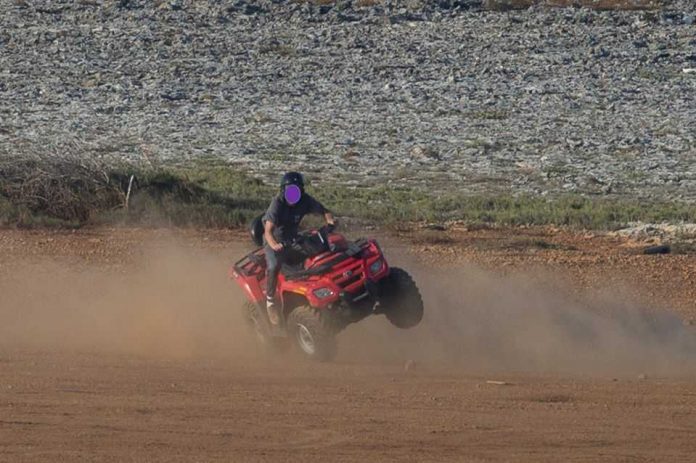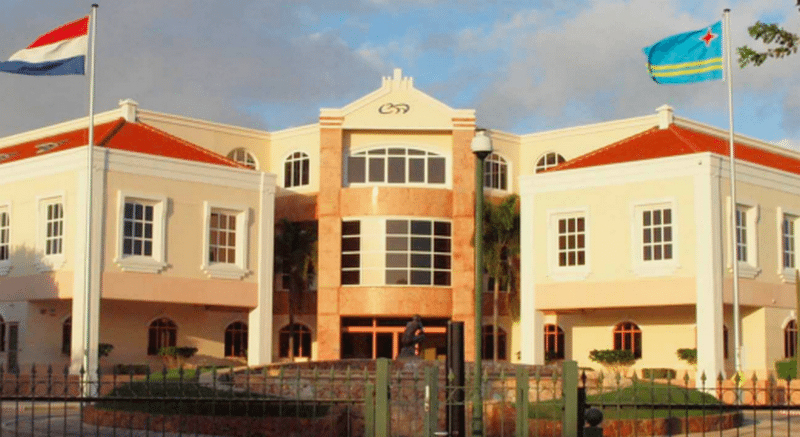Over the years, natural / protected areas suffered damage caused by different factors, amongst others, from the ATV / UTV vehicles. In this time of COVID-19 crisis where people were urged to stay inside as much as possible we saw roads without ATV’s, jeeps and cars, empty beaches and less pollution in the air. We could hear the birds sing and see goats crossing roads again. Our national park Arikok is closed to visitors since March 23 and nature is flourishing. Plants and flowers arise, animals recover their space. As the world slowed, Mother Nature was taking a breath!
Now that Aruba is opening up again the discussion about protecting nature is as strong as ever. Roads are filled again with traffic and beaches, especially in the weekend, flood with people. We see empty bottles in the sand and find other disposables in the bushes. Is this the new normal we wonder? Weren’t we determined to do it differently and what about the joy we experienced seeing cactus green again instead of covered with dust because of passing motorized vehicles?
Vehicle inspection
Minister Marisol Lopez – Tromp, Minister of Spatial Development, Infrastructure and Environment is working on ways of improving this situation, she announced recently. The two primary aspects that Lopez-Tromp will be focusing on are: (1) Protection of Aruba’s Natural areas, (2) but also the process of vehicle inspection which is carried out by the Department for Technical Inspections (DTI). Remarkable is that Aruba is among the few countries that allow driving of ATV / UTV vehicles on highways. Considering this aspect, the safety of these vehicles (for drivers and general traffic) is a concern, as stated by the minister. DTI is the government department that is in charge of vehicle inspection, including ATV / UTV vehicles. Currently a relatively small group of ATV / UTV has attended and fulfilled a vehicle inspection. The procedure involves: control for valid insurance, control for number plate payment and the overall condition of the vehicle. These factors determine if the vehicle (in this case the ATV/ UTV), will successfully complete the inspection. Aruba Today asked the minister if these inspections are going to be mandatory and if new permit requests for ATV companies will be denied as also permits for extension of the existing ATV companies. We are pending an answer to those questions from the minister.
National Park Arikok (FPNA) introduced their new policy with regards to ATV’s, UTV’s and SUV’s. They ban ATV’s as of June 1st, restrict the number of UTV’s and SUV’s as of June 1st, and ban UTV’s as of October 31st.
Advocating regulation
A foundation that fights for protection of nature, Aruba Birdlife Conservation, says: “It’s time for a moratorium on UTV’s and ATV’s and it is time to regulate off-road tourism. Adventure tourism shouldn’t destroy Aruba’s flora and fauna. Such belongs to the next generation.”
The Aruba Hotel & Tourism Association (Ahata) continues to advocate for regulation of UTV and ATV vehicles on the island, for the sake of safety of the visitors and protection of Aruba’s biodiversity. During a recent meeting with the Minister of Justice, the Minister of Spatial Development and Environment, and the Minister of Transport, the CEO of AHATA, Tisa LaSorte, had the opportunity to reiterate the request for regulation sent to the government in January of 2019. It was agreed by all that regulation is essential. The Minister of Justice assured AHATA that the Aruba government has no intention to ban UTV and ATV vehicles; to avoid further job losses during difficult economic times.
The Minister of Spatial Planning and Environment, Marisol Lopez – Tromp, explained that the most recent legal step taken was to introduce 16 areas on the island as “protected nature areas”. Motorized traffic is prohibited from these protected areas. The Minister of Transport added that efforts are being made to introduce regulation for the vehicles, however, the process involves 5 ministries which requires a lot of coordination.
It was agreed by all that inspections of vehicles are one of the important requirements that must be enforced as well. AHATA voiced concern for fair implementation and enforcement, so all companies are equally regulated and compliant.
The conversation also touched on the goal to inspire creation of low-impact activities in the national park. AHATA will continue to help FPNA to achieve responsible recreation within the nature preserve. Meanwhile, AHATA shall also continue to seek clarification for the activity companies that have been affected by the new vehicle policy.
The other side
The newly founded Aruba Off-Road Foundation represents the interest of about 20 Off-road Rental Companies and tour operators. Their wish is to be involved in the decision-making about the off road-vehicles seeing that this is their source of income. They state to understand the need for nature protection, but they have preoccupations about the new regulations within the national park as well as the 16 protected nature areas announced by the Minister of Spatial Planning and Environment.




















